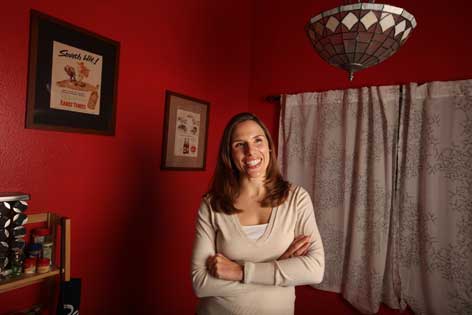Family matters

Family matters
- November 4, 2010
- Americans’ definition of the basic societal unit is expanding, says sociology assistant professor Catherine Bolzendahl
 Catherine Bolzendahl has spent much of her professional life studying how divorce,
remarriage, stepparenting, same-sex unions and other factors affect public perception
of the modern family. Her most recent findings, conducted with a team of sociologists
from around the country, are detailed in Counted Out: Same-Sex Relations & Americans’ Definitions of Family, published recently by the Russell Sage Foundation.
Catherine Bolzendahl has spent much of her professional life studying how divorce,
remarriage, stepparenting, same-sex unions and other factors affect public perception
of the modern family. Her most recent findings, conducted with a team of sociologists
from around the country, are detailed in Counted Out: Same-Sex Relations & Americans’ Definitions of Family, published recently by the Russell Sage Foundation.
The most significant discovery, according to the UC Irvine assistant professor of sociology, is the change in Americans’ attitudes toward same-sex couples. Between 2003 and 2010, three surveys conducted by the team showed an increase from 54 percent to 68 percent in the number of people who consider such committed pairs families.
“What we see is a steady move toward the long-term acceptance of gays and lesbians,” Bolzendahl says. “A majority of Americans now say their definition of family includes same-sex couples with children, as well as married gay and lesbian couples.”
Acceptance of same-sex marriage is following a pattern similar to that of interracial marriage, she notes. Mixed-race unions were considered taboo and even prohibited for much of U.S. history, until a 1967 Supreme Court ruling that such bans were unconstitutional.
“As legal status changed, minds changed too,” Bolzendahl says. “If same-sex marriage is legalized in California – or the country as a whole – a lot more people will be willing to define these couples as family. The relationship between legal status and acceptance shows how powerful and legitimizing marriage can be.”
She says the issue fascinates her because of its implications for inheritance practices, insurance policies and hospital visitation rights.
Bolzendahl and the other researchers, led by Indiana University sociologist Brian Powell, surveyed more than 2,300 people by phone on same-sex marriage, unmarried cohabitation, gay adoption and even the inclusion of pets as family members. Among their findings:
- Americans in 2010 are nearly evenly divided about same-sex marriage, with 52 percent supporting it and 48 percent opposed.
- In 2010, 50 percent more people than in 2003 reported having a gay friend or relative – 42 percent to more than 60 percent.
- Americans value children when considering family ties. In the 2010 survey, 83 percent of respondents said an unmarried heterosexual couple with children constitute a family, while only 40 percent felt that way about unmarried heterosexual couples without children. Similarly, survey participants were much more likely to view a same-sex couple with children as a family than a childless same-sex couple.
- When asked in 2006 if gay couples or pets count as family, 30 percent said pets did but not same-sex couples. (The question wasn’t posed in 2010.)
Joining Bolzendahl and Powell in the study were sociologists Claudia Geist of the University of Utah and Lala Carr Steelman of the University of South Carolina.
— Laura Rico, University Communications
— photo by Michelle Kim, University Communications
Share on:
Related News Items
- Why federally funded social science research matters: How we make decisions in hybrid teams
- Trump stopped federal funding to Maine over transgender athletes. Could California follow?
- Why federally funded social science research matters: How we age
- The last letter
- Brand-new colour created by tricking human eyes with laser


connect with us: